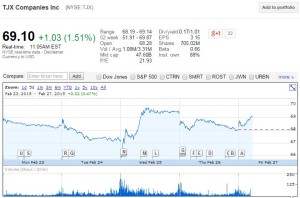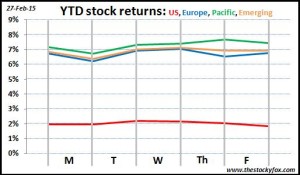The biggest stories this week were: Fed speaks to congress (Tuesday, Wednesday), American cars get high rank (Tuesday), TJ Maxx raises wages (Wednesday), and Net neutrality regulations passed by the FCC (Thursday) . Of course, there were the daily Greek gyrations, but I figured I covered that adequately on Wednesday. It was a pretty tame week for the markets virtually flat across the board.
Janet Yellen spent Tuesday and Wednesday testifying before Congress, and the markets were hanging on her every word, of course waiting for any indication as to when the Fed will raise interest rates. As par for the course, about half the market watchers thought her comments dovish, indicating that the currently low rates would remain low for longer, while others thought her comments hawkish, indicating that a rate increase would happen sooner.
Of course, when the Fed does increase rates, it will most likely mean they think the economy is healthy enough to not to have to be propped up by the super-low interest rates that have been present for the past 5+ years. The markets will freak out when that happens in the short term, but it will be a good thing for the long term.

Consumer Reports announced its annual winners for each car category, and American brands sat atop three of the ten categories, including Tesla being named best overall car. This is important for a couple reasons: First, it shows that the domestic car industry is alive and well, creating really strong offerings. This will of course lead to greater sales which will lead to higher profits and ultimately rising stock prices. So that seems particularly good for the US automotive industry that was so bad for so long.
Second, the report really highlights the amazing technological advances that are going into all these cars. These cars (and trucks) are becoming computers integrated into our lives in amazing ways. They’re making driving safer and more convenient. Over the next 10 or so years, I think we’re going to see a major transformation in the auto industry, especially as self-driving features become mainstream, which is going to be amazing for society but also tremendously profitable for the companies who can put it together. Also, it doesn’t hurt that tremendous innovators like Google and Apple are entering the fray.

On the heels of Wal-mart’s announcement last week, TJ Maxx announced that it was following suit in raising the wages of their lower-paid workers to $9 per hour. In contrast Wal-mart’s experience, TJ Maxx’s stock rose sharply on the news; of course, that was the same day they announced really strong quarterly earnings. So it’s hard to tell if the market thought that TJ Maxx’s wage decision was a good one, or if they thought it a bad one which was masked by the otherwise good earnings news.
Either way, it’s undeniable that now this movement has a little momentum. Wal-mart and TJ Maxx are just two of thousands of companies that have low-wage workers, but now there are two more companies who are voluntarily raising their wages than there were before two weeks ago. If this movement continues to grow, it will certainly have important implications for the stock market but also, more importantly, society as a whole. It will pressure the profits of those companies (a bad thing for stocks), but it will also put more money in the pockets of a segment of the population that is mostly likely to shop at those stores (a good thing for stocks).
Also, probably the largest implications for this are appealing to my libertarian roots. Wal-mart and TJ Maxx have voluntarily made these moves. No government intervention was required (although perhaps it was the threat of government intervention, but I doubt that given our divided government). Will this show that when left to their own devices, companies will find win/wins for themselves and their employees? I hope so.
This is one that definitely will be a big deal; the only thing now is no one really knows if it will be a big deal in the positive or negative direction. This legislation just passed by the FCC imposes rules on internet carriers similar to those placed on phone carriers. It has a lot to do with how internet carriers now cannot provide preferential access to certain websites, etc. (although I must admit that I find the legislation confusing).
The reason I think this is so important is that this is one of the first steps in governing the largely “unregulated” internet, and that poses the question: “Is that a good thing?” On the one had you could say that the internet has grown up and is now such an integral part of our lives and our economy that it has to be regulated to ensure fairness, safety, quality, etc. On the other hand, you could say that the internet has grown to be so valuable because it has been given a free hand to grow as the open market dictates, and government meddling will just mess all that up.
I am a strong believer in free markets, and I side with the idea that less government regulation tends to be better. These changes make me a little apprehensive. The regulations the FCC is imposing are similar to the ones imposed on long-distance phone carriers 80 years ago, so reasonable people may wonder how appropriate that is. Also, this is happening in a thriving part of the economy that has provided amazing technological advances that have given huge benefits to society, so the stakes are pretty high. I just hope we don’t look back on this and say this is one of the things that hobbled the internet.
So there you have it. Greece and the Fed took center stage and spent a lot of time saying stuff that didn’t have a lot of substance to push the market one way or the other. But you also had some pretty interesting stories pushing stocks both higher and lower. At the end, we ended up pretty much where we started, and isn’t that just the way with these things so often.
